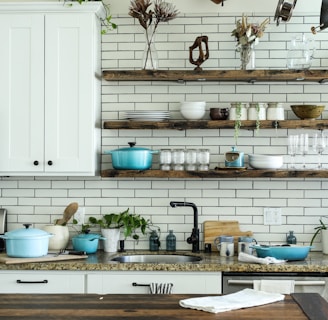5 Zero-Waste Kitchen Swaps to Reduce Plastic Use
Transform your space into a zero waste kitchen with 5 simple swaps—ditch plastic for sustainable essentials like reusable wraps and compost-friendly solutions.


5 ZeroWaste Kitchen Swaps to Reduce Plastic Use
Going zero waste in the kitchen doesn't mean giving up convenience—it means making smarter, more sustainable choices that reduce your plastic use and help the planet. These five eco-friendly kitchen swaps are easy to integrate into your daily routine and make a meaningful difference over time. Want to extend your sustainable habits beyond the kitchen? Check out our 10 Budget-Friendly Home Decor Ideas for a Cozy Living Room for eco-friendly inspiration around the house.
1. Swap Plastic Wrap for Beeswax Wraps
One of the simplest ways to reduce plastic is to stop using single-use plastic wrap. Beeswax wraps are a reusable, plastic-free kitchen essential that works just as well and looks charming.
Why It Works:
Made from cotton infused with beeswax, tree resin, and jojoba oil
Naturally antibacterial and washable
Ideal for wrapping sandwiches, fruits, cheese, or covering bowls
Suitable For:
Everyday kitchen use
Packing school or work lunches
Check out "beeswax wraps"
2. Replace Plastic Dish Sponges with Compostable Dish Brushes
Traditional dish sponges are made from plastic and harbour bacteria over time. Replacing them with a compostable dish brush is one of the easiest eco-friendly kitchen swaps. Pair your new cleaning tools with our 5 Natural DIY Cleaning Hacks for a Toxic-Free Kitchen to keep your space green and fresh.
Key Features:
Made from bamboo, coconut fibre, or plant-based bristles
Can be composted at the end of life
Long-lasting and effective on tough grease
Health Tip: These brushes dry quickly and are less likely to grow bacteria than sponges.
Check out "bamboo dish brush"
3. Use Refillable Glass or Stainless Steel Containers
A great way to adopt a sustainable kitchen product mindset is to opt for glass jars or stainless steel containers instead of plastic ones. These options are better for your health and the environment. If you're new to eco-living, explore our Beginner's Guide to Sustainable Living for easy lifestyle
swaps.
Benefits:
Non-toxic and BPA-free
Keeps food fresh without leaching chemicals
Easy to clean and dishwasher-safe
Check out "glass storage containers"
🌱 Learn more about safe food storage containers from the Environmental Working Group (EWG).
4. Switch to Silicone Baking Mats Instead of Parchment Paper
Parchment paper may seem eco-friendly, but it is often coated with non-recyclable materials. A reusable silicone baking mat is a sustainable kitchen product that's better for the environment and your wallet.
Why We Love It:
Non-stick and oven-safe
Easy to clean and reuse
Reduces waste from single-use papers
✅ Tip: Choose FDA-approved, BPA-free silicone.
Check out "silicone baking mats"
5. Buy in Bulk with Reusable Produce & Bulk Bags
When creating a plastic-free kitchen, one key swap is to use reusable mesh or cloth bags for your fruits, veggies, grains, and legumes. They're practical and reduce waste during shopping.
Benefits:
Lightweight and washable
Reduces reliance on disposable bags
Encourages buying in bulk (reduces packaging waste)
Check out "reusable produce bags"
🌿 Environmental Awareness: Bulk shopping reduces emissions associated with packaging and transportation.
FAQs
Q1: How can I reduce plastic use in the kitchen without spending too much?
Start with one or two zero-waste kitchen swaps, such as beeswax wraps or reusable bags, and gradually build up.
Q2: Are silicone mats eco-friendly?
Yes—while they are made of synthetic material, their long lifespan makes them more eco-friendly than disposable parchment.
Q3: What's the best container type for zero-waste storage?
Glass and stainless steel are top choices due to their safety, durability, and sustainability.
Q4: Is switching from sponge to brush hygienic?
Absolutely. Natural brushes dry faster and reduce bacteria build-up.
Q5: Do these swaps make a difference?
Yes. Each small step helps reduce plastic pollution and fosters eco-conscious habits in your home.
Conclusion
Transitioning to a zero-waste kitchen doesn't have to be overwhelming. Adopting a few practical, eco-friendly kitchen swaps can drastically reduce plastic use and contribute to a healthier planet.
Start small—choose one or two swaps today—and build your sustainable kitchen journey step by step. And don't forget to follow us on Pinterest for more sustainable kitchen products and green living inspiration.
Also Green
Embrace a mindful and eco-friendly lifestyle today.
Contact
contact@alsogreen.com
© 2025 Also Green. All Rights Reserved
+14706521930
